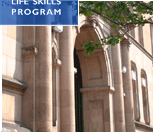
The ten units in the Adkins Life Skills Program: Career Development Series are directed at helping people understand themselves, learn how to explore career and job alternatives, use resources, make career-related choices and plans, acquire the skills they need to apply and interview for jobs and develop work adjustment coping strategies to keep their job and advance on a career ladder.
The Choosing Module
Unit 1 Exploring Who I Am and Where I Want To Go
Learners initiate the self-assessment process by examining their interests, abilities, personal characteristics in relation to job and career alternatives. They begin to believe they can make choices and gain confidence in their ability to carry them out; leads to a formal videotaped " Who I Am" presentation.
Unit 2 Exploring the World of Work
Learners explore a broad range of occupational possibilities, learn strategies for evaluating information about jobs and careers that interest them and are exposed to a variety of print-based and Internet based sources of information about occupations, education and training opportunities.
Unit 3 Making Good Career Decisions
Learners identify their decision-making style and examine the processes of career decision making. They identify internal and external barriers that may be inhibiting their own choice process and conclude the self-assessment process by using their goals, feelings and needs to evaluate career choices.
The Job Search Module
Unit 4 Finding Job Information and Contacting Employers
Learners acquire the skills they need to use basic sources of information about locating employment and training opportunities in their community. They learn how to conduct their own job searches, read and interpret want ads, make effective telephone calls and write letters of inquiry about employment opportunities.
Unit 5 Using Employment Agencies and Personal Contacts
Learners become aware of the concept of networking and identify a variety of personal and professional contacts to approach for information or assistance in obtaining jobs or getting into education and training programs. They also learn how to use employment agencies and become familiar with interviews, contracts, application forms and fees.
The Career Planning Module
Unit 6 Planning and Managing Time Effectively
Learners are introduced to planning skills by selecting a non-vocational project or goal they want to accomplish. They define the sequence of steps needed to accomplish it and use time management strategies to schedule, prioritize, monitor, overcome obstacles and complete tasks related to their goal.
Unit 7 Developing a Career Plan
Learners prepare a short-term and long-term plan for achieving their employment, career and educational goals. They develop strategies, describe stages and steps to be taken, prepare a calendar and time chart and incorporate the concept of a career ladder into their plans and goals.
The Getting a Job Module
Unit 8 Presenting Myself on Paper: Application Forms and Resumes
Learners are introduced to formal methods for applying for jobs. They learn how to prepare an employment application, examine typical mistakes people make, and learn to reply to each question. They learn through a step-by-step process how to write their own resumes and prepare cover letters to accompany them.
Unit 9 Developing Effective Interviewing Skills
Learners identify and demonstrate a variety of effective verbal and non-verbal communication skills to use in the employment interview. Video modeling tapes present examples of ineffective and effective behaviors. Strategies for handling difficult questions are reviewed and learners practice job interviews which are videotaped for feedback and discussion.
The Keeping a Job Module
Unit 10 Keeping a Job: Strategies that Help
Learners begin to recognize and handle problems that could lead to losing or leaving a job. They analyze employer-employee responsibilities, explore on-the-job problems they might have with respect to absenteeism, taking directions from supervisors, dealing with authority, handling conflicts with co-workers and managing time on the job. They role-play methods to help overcome these difficulties and also learn about grievances and sexual harassment issues.
[ TOP ] |


